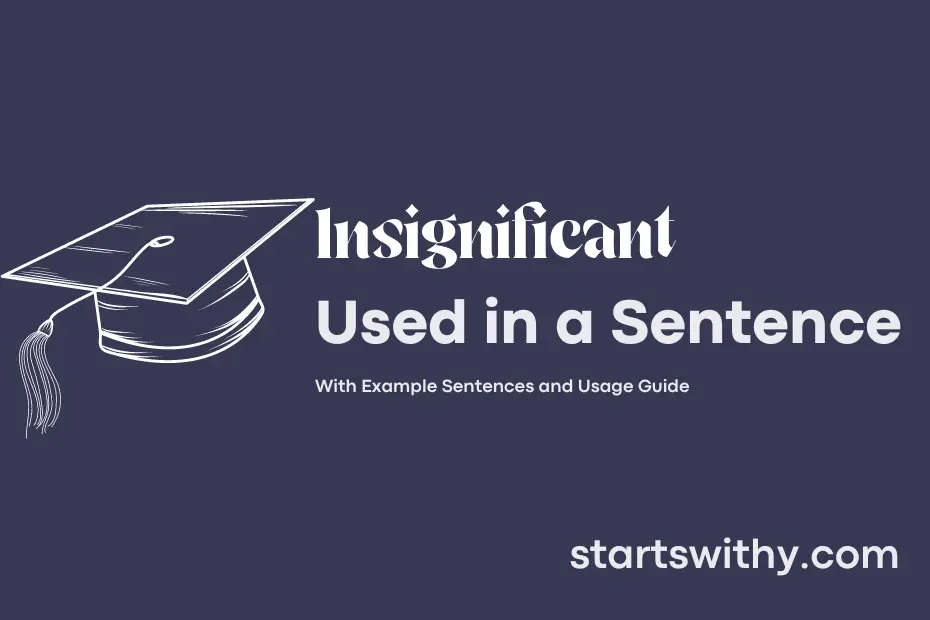Have you ever struggled to convey the idea that something is trivial or unimportant in your writing? This is where the word “insignificant” comes into play.
Used to describe something that holds very little importance or value, “insignificant” is a powerful term to express the lack of significance of a particular object, event, or statement.
7 Examples Of Insignificant Used In a Sentence For Kids
- The ant is an insignificant insect.
- A small pebble is insignificant compared to a big rock.
- An insignificant amount of water is left in the glass.
- The dot on the paper is insignificant to the whole picture.
- The toy car is insignificant next to the real car.
- A tiny seed may seem insignificant, but it can grow into a big tree.
- The speck of dust on the table is insignificant but needs to be cleaned.
14 Sentences with Insignificant Examples
- The number of likes on your social media posts is insignificant compared to the quality of content you produce.
- Missing one lecture will not have an insignificant impact on your final grades if you consistently attend the rest.
- The cost of printing notes at the library is insignificant when you consider the knowledge gained from those resources.
- An insignificant error in your referencing can lead to a deduction in your assignment marks.
- A fluctuation in the stock market may seem insignificant now, but it’s important to stay informed about financial trends.
- The insignificant amount of time spent organizing your study materials can greatly improve your productivity levels.
- It’s easy to disregard the insignificant changes in your routine, but small adjustments can lead to significant improvements.
- Skipping breakfast may seem insignificant, but it can have a negative impact on your energy levels throughout the day.
- The insignificant increase in study time can make a big difference in your understanding of complex subjects.
- A seemingly insignificant interaction with a professor can open doors to valuable opportunities in the future.
- The cost of a monthly gym membership may seem insignificant compared to the long-term benefits of maintaining a healthy lifestyle.
- The insignificant delay in submitting your assignment can result in late penalties or even a lower grade.
- A minor change in your study environment may initially appear insignificant, but it can greatly impact your focus and concentration.
- An insignificant mistake in your exam preparation can lead to a major impact on your final grades.
How To Use Insignificant in Sentences?
To properly use Insignificant in a sentence, you must first understand its meaning. Insignificant refers to something that is unimportant, lacking significance, or not valuable. Here is a simple guide to help beginners use it correctly in a sentence:
-
Identify the Context: Look for situations where something is deemed as unimportant or lacking in significance.
-
Placement in a Sentence: Place Insignificant before the noun or adjective it is modifying. For example, “The small scratch on the car was insignificant.”
-
Choose Appropriate Synonyms: Insignificant can also be replaced with words like trivial, negligible, or minor. For example, “Her contribution to the project was insignificant.”
-
Consider the Tone: Think about the tone you want to convey. Using Insignificant may suggest a sense of unimportance or triviality.
-
Practice Makes Perfect: Try using Insignificant in different sentences to further understand its usage and nuances.
Remember that Insignificant is used to describe things that lack importance or have little relevance. By following this guide and practicing, you can effectively incorporate Insignificant into your vocabulary and writing.
Conclusion
In the realm of language and writing, sentences with insignificant content serve little purpose in conveying meaningful information or contributing to the overall message. These sentences, lacking in substantial value or impact, are often overlooked and disregarded by readers as they do not add any substance to the text. Writers should strive to create sentences that are clear, concise, and meaningful to enhance the readability and comprehension of their work.
By recognizing and eliminating sentences with insignificant content, writers can improve the quality and effectiveness of their writing. Focusing on conveying important information and ideas concisely will help maintain the reader’s interest and ensure that the message is communicated effectively. In essence, avoiding sentences with insignificant content is essential in crafting compelling and engaging writing that resonates with the audience.



